
Ivy Blog
Father Beats Medulloblastoma, a Rare Brain Cancer in Adults
- June 15, 2025
- Ivy Center
- Posted in Patient Stories

In less than two months, Joshua Zahn went from living as a healthy 31-year-old father and financial
advisor to embarking on an arduous brain cancer journey. But thanks to the world-class care at
Barrow Neurological Institute, combined with Joshua’s strong support system and own determination,
he overcame his aggressive tumor and returned to his life.
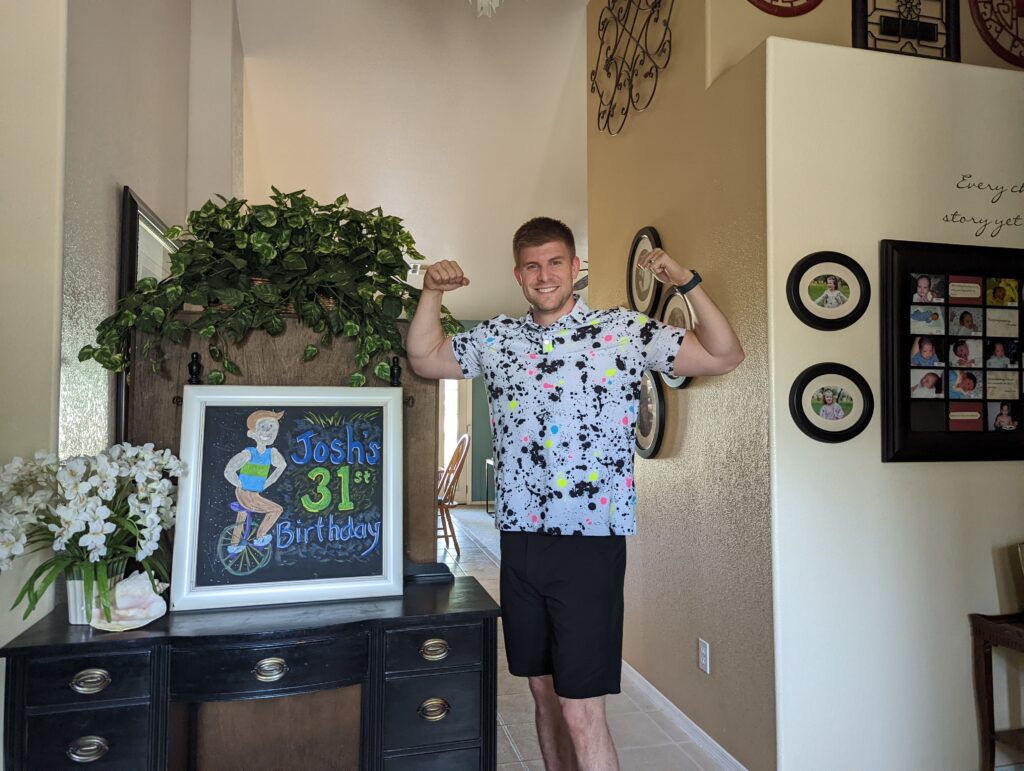
Sometimes life gives us lemons. For Joshua and Alycia Zahn of Gilbert, Arizona, it was more of a clementine.
In early 2023, Joshua learned he had a cancerous tumor the size of a clementine orange growing in the cerebellum of his brain. Shaped like a half circle, the cerebellum sits at the base of the skull and helps to control balance, coordination, and several complex motor functions.
Joshua’s biopsy at Barrow Neurological Institute confirmed he had a medulloblastoma. While these
tumors represent the most common type of brain cancer diagnosed in children, they are rarely seen in
adults. In fact, medulloblastomas account for only about one to two percent of all adult brain tumors.
Joshua was just shy of 32 years old at the time of his diagnosis.
Like most other medulloblastomas, though, Joshua’s tumor grew rapidly—not only occupying important
real estate in his brain but also threatening to invade other parts of his body.
Losing Grip—Literally
One day while playing his drums, a hobby Joshua had practiced nearly every day for more than 25 years,
he found himself struggling to hold onto the drumstick.
“Grip on your drumstick is an important thing,” he explained. “You don’t hold it tight, but you hold it just
enough to keep it there. I just kept crossing my arms to get to a different symbol, and I would end up
throwing the stick.”
“Like, launching it across the room,” added Alycia, Joshua’s high-school-sweetheart-turned-wife.
After about 20 minutes of repeatedly flinging the drumstick, Joshua set it down and shrugged off the
mishaps as a “bad day.” After all, he felt normal otherwise. “Then it happened again the next day and
the next day,” he recalled.
Over the next week, Joshua developed other symptoms. He suddenly struggled to perform everyday
tasks like writing and walking in a straight line. He also began slurring his words and experiencing severe headaches.
Joshua visited his primary care physician, who suspected something neurological and ordered a
magnetic resonance imaging (MRI) scan of Joshua’s brain. The MRI report noted an abnormality but
nothing definitive.
After Joshua sent his imaging to Barrow at the recommendation of a colleague, his diagnosis and
treatment journey charged full speed ahead.
An Unlikely Diagnosis
When Joshua was referred to Nader Sanai, MD, Alycia researched the neurosurgeon online and saw he
serves as chief of neurosurgical oncology at Barrow and as director of the Ivy Brain Tumor Center.
Between the mass on Joshua’s imaging, the urgent appointment with Dr. Sanai, and the reticence of a
doctor in their family who looked over the MRI report, the Zahns knew they were facing something
serious.
Dr. Sanai’s team quickly scheduled Joshua for a biopsy and, about a week later, delivered the diagnosis
of a medulloblastoma. However, they couldn’t confirm the subtype until after removing the tumor
entirely and sending it off for molecular testing. Understanding the molecular subtype of a tumor helps
to inform prognosis and treatment planning.
Joshua later learned his tumor was associated with mutations in the so-called “Sonic the Hedgehog”
(SHH) genetic pathway, which provided some comic relief to the self-proclaimed “gamer nerd.”
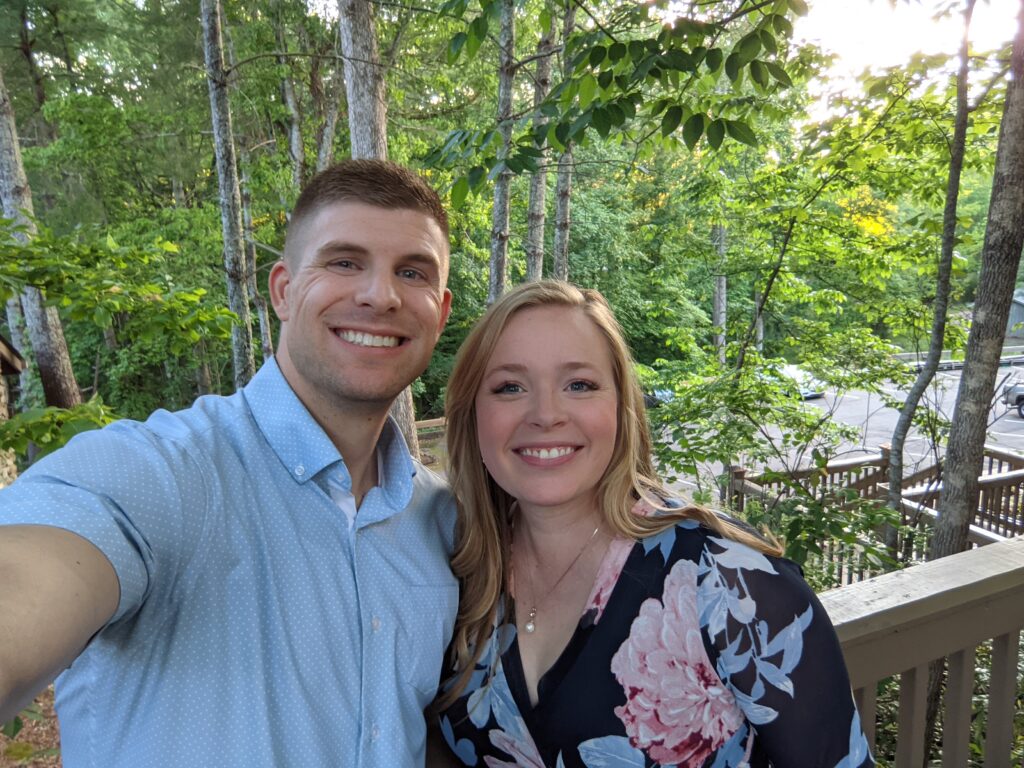
Still, the news was surreal for Joshua and Alycia. About a month and a half after fumbling on his drum set, Joshua found himself preparing for a complex surgery to remove an aggressive tumor endangering his brainstem—the vital connection between the brain and the spinal cord.
“It happened so fast,” he recalled. “It was like, what are our options? Pretty much brain surgery.”
Bearing the Bad News
The son of two “criers,” Joshua has always seen himself as an emotional guy. Since brain surgery,
though, his tears seem to flow even more freely than before. He and Alycia both choked up as they
reflected on sharing Joshua’s diagnosis with their friends and family members, particularly their three
young daughters.

While Joshua knew he had brain cancer and that surgery was the next step, he and Alycia didn’t know much else with any certainty. Would Joshua survive the surgery? Would he wake up with significant deficits? When would he come home, and what would life look like after he did? They had all the same questions as their loved ones. “I think the worst part was the ‘I don’t know,’ answer,” Alycia said.
To keep everyone updated as best as she could, Alycia created a Facebook group dedicated to Joshua’s brain cancer journey. Their nurse navigator at Barrow, Jacki Garcia, RN, BSN, CNRN, had encouraged them to pull in their village. “It’s incredible how wide your network really is when you’re living in the day to day,” Alycia said. “You don’t realize how many people you know.”
‘The Longest Day of My Entire Life’
Despite the many uncertainties for Joshua, he and Alycia did feel sure of something: They had chosen
the right place for his care. They felt reassured by the approachability, patience, confidence, and skill
shown by Dr. Sanai and his team.
“He and Jacki both said, ‘I know this is wildly scary and you’ve never encountered anything like this, but
we do this every day,’” Alycia recalled. “As awful as it is, when you start thinking about it—the fact that
they do and it is the everyday—it gives you the utmost confidence. … I’m signing this paper that says he
may die in surgery, because there’s always a chance, and yet there’s this overwhelming peace that he’s
in the best possible hands.”
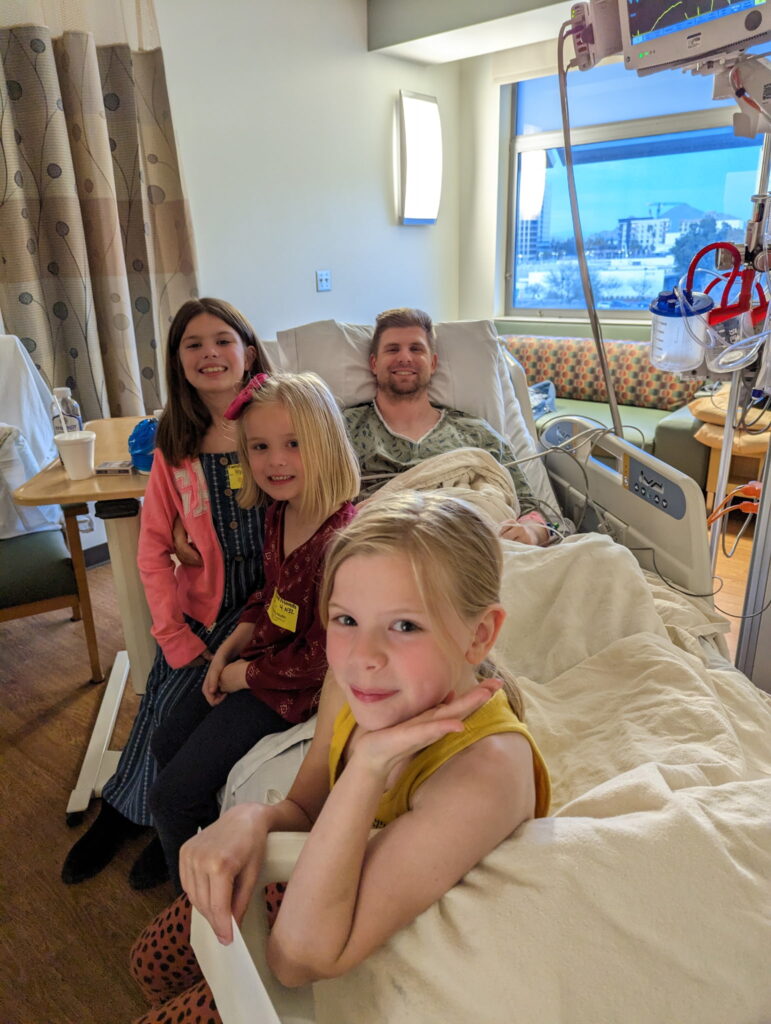
In March of 2023, just two months after his primary care visit, Joshua entered the operating room at Barrow for brain tumor surgery. He had unexpectedly arrived at the hospital a couple of days before the procedure, via the emergency department, due to a debilitating headache. His medulloblastoma was causing his brain to swell, requiring steroid therapy in the Neuro-Intensive Care Unit.
“I tried to put on a brave face while they wheeled you away,” Alycia said to Joshua as she remembered the morning of surgery. “That was the longest day of my entire life.”
About nine hours later, after occupying herself with visits from loved ones and by coloring sheets of paper with motivational quotes, Alycia reunited with Joshua.
“Every medulloblastoma resection requires several dimensions of neurosurgical specialization; it was gratifying to see the complex technical considerations of Joshua’s case navigated with success. This was a big operation, and his remarkable recovery was a credit to him, his family, and the multidisciplinary team working in unison,” said Dr. Sanai.
Road to Recovery
That long day in the operating room marked the beginning of a much longer recovery for Joshua. After
surgery, he spent three weeks in the inpatient unit at the Barrow Neuro-Rehabilitation Center relearning
everyday tasks, such as walking and talking.
Although Alycia tried to remain positive and encouraging, she quietly worried how much function Joshua would regain and what that would mean for her as his caregiver. It was hard to watch her young,
athletic husband struggle to walk and talk, but she also found hope in his determination and their faith.
“It was apparent pretty quickly that he was going to fight hard to regain a lot of that back,” she said.

Alycia described Joshua’s inpatient therapists as “incredible Earth angels” for the ways they encouraged Joshua and tailored his therapies to meet his individualized goals and passions.
An avid gym-goer prior to surgery, Joshua feared he’d never be able to do a pushup again. When he expressed his frustration about it, one of his therapists worked with him to perform a modified pushup—right then and there. And because of his background as a collegiate athlete, his therapists engaged him with sports activities like shooting baskets and kicking a ball.
Joshua knew he could perform the tasks, as he’d done them countless times before and had memories of doing them. But there was a disconnect between knowing he could do something and actually making it happen.
“I had to retrain my muscles to move,” he said. “I don’t even think we think about walking or writing or anything; we just do it. So to have to think about doing that again, it was so weird for me.”
After demonstrating that he could safely perform basic functions, such as getting in and out of the
passenger seat of a vehicle and walking up and down steps, Joshua was discharged from inpatient
neuro-rehabilitation. He was referred to outpatient therapy, with the expectation that it would last
about 18 months—starting with three to four times a week and gradually decreasing in frequency.
Defying the Odds
While undergoing occupational, physical, and speech therapy, Joshua also endured six weeks of
radiation treatment. And as radiation came to an end, Joshua began yet another leg of his journey:
chemotherapy. Although he tolerated the chemotherapy well overall, his energy levels dipped. Alycia
frequently reminded him to slow down and rest, which the financial advisor found difficult to accept. He
had already gone back to working about 25 to 30 hours a week and often sent work-related emails while
receiving chemotherapy infusions.
Still mostly reliant on a wheelchair when he left inpatient neuro-rehabilitation, Joshua had progressed to
a walker less than three months after surgery. However, a buildup of fluid in his brain and subsequent
shunt surgery to drain the fluid set his progress back. A few months after that, though, he was walking
with a cane and graduating from speech therapy. By summer 2024, he had graduated from all therapies
and received clearance to drive. That fall, he returned to the gym five days a week.
“He kind of defied all odds, and that’s been amazing to watch,” Alycia said.
Joshua still notices some deficits. He’s critical of his speech and the slowness of movement in his right
hand. But he’s also proud of how far he’s come and excited to continue making progress.
“He’s made incredible progress,” said Kelly Braun, MD, Joshua’s neuro-oncologist. “After surgery, he worked hard to overcome his deficits, especially with balance, and now he’s back in the gym four to five times a week. His energy and endurance have improved significantly, and he’s back at work and doing great. It’s truly inspiring to see how far he’s come.”
Joshua and Alycia expressed their gratitude for Dr. Braun throughout the journey, noting her knowledge,
kindness, encouragement, and relatability. Dr. Braun underwent brain tumor surgery herself, after a golf
ball-sized meningioma began pressing on her brainstem in her 20s. “She understands from the patient
perspective so well,” Alycia said. “She lived it.”
Celebrating Life and Sharing Perspective
Joshua continues to have MRI scans to monitor for any sign of the medulloblastoma’s return. He’s had about a dozen scans since surgery, and he’s received the “all clear” each time. Last fall, he and Alycia felt confident enough in the stable scans to plan a citrus-themed “JZ is Cancer Free” party, where they officially bid farewell to the infamous “Clementine Cleatus”—the name they had given Joshua’s brain tumor.
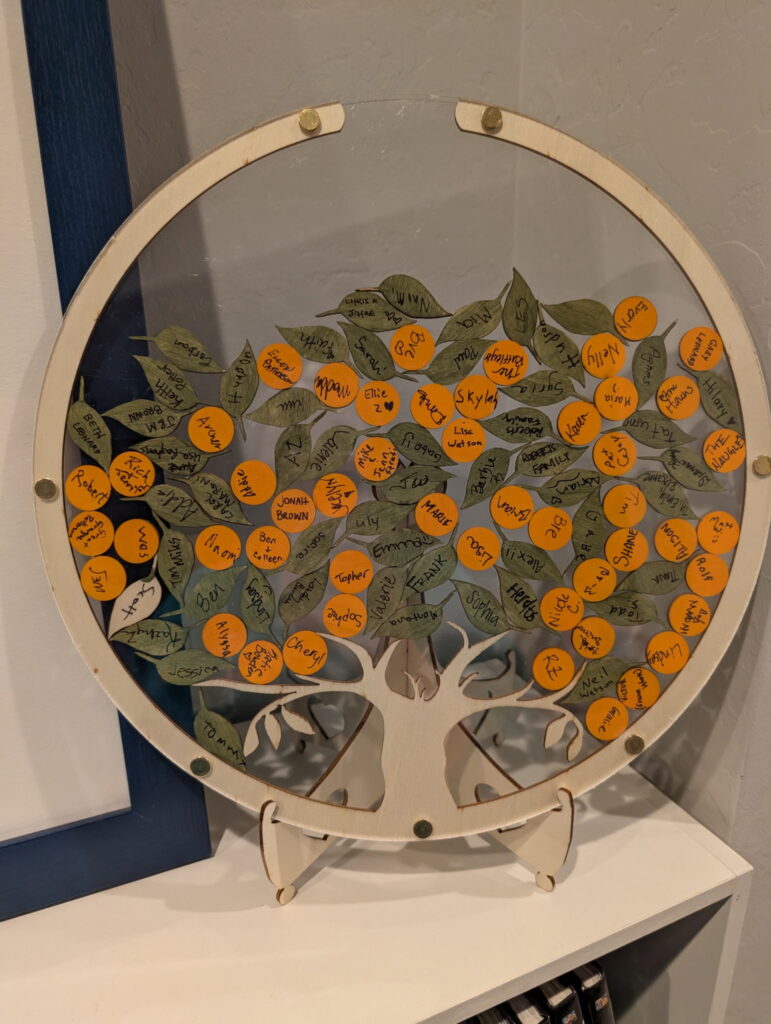
This spring, the Zahn family returned to one of their favorite travel destinations for the first time since surgery: Disneyland. Joshua opted to forgo the disability pass and the scooters for rent, but the Zahns did extend their park passes to five days instead of two or three so that Joshua wouldn’t feel rushed. “But the good thing is, I did all five days,” Joshua said. “We went from pretty much open to close, and it was tiring in the end, but anyone gets tired at Disneyland.”
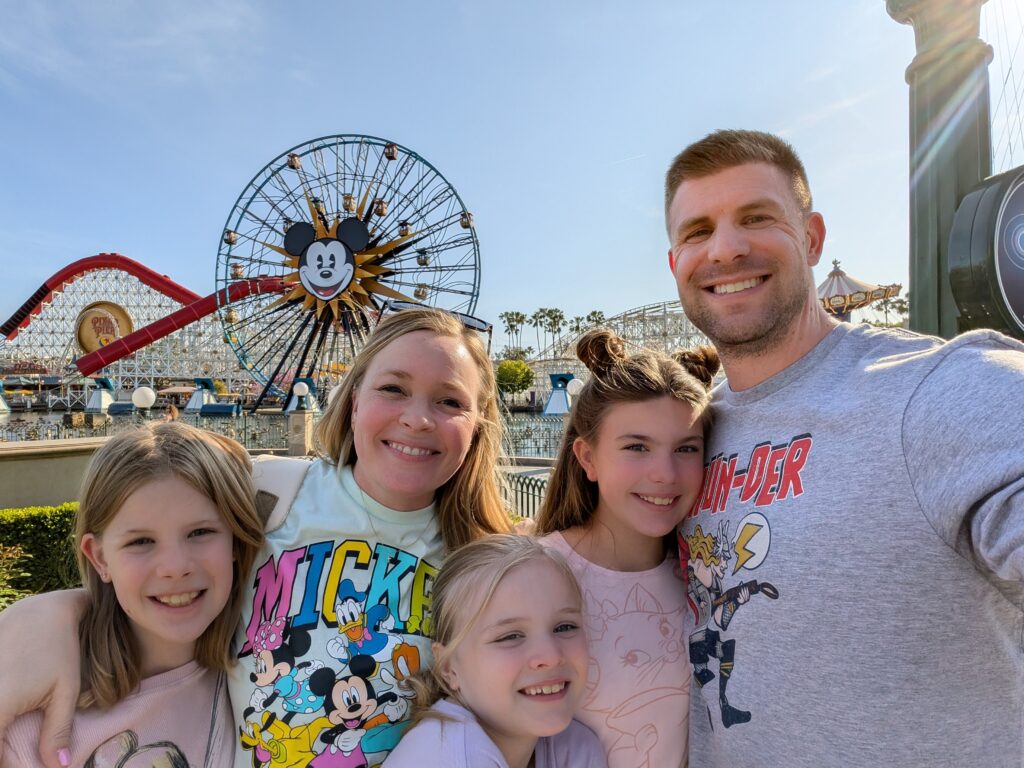
He was also pleasantly surprised to find that most rides didn’t bother him, since he was unsure how all of the movement would make him feel. He still screamed alongside his kids and, of course, ate a lot of churros. “It’s not a Disney trip if you didn’t,” Alycia said.
Today, Joshua is proud to share his story in hopes that he can help others who might be navigating a similar experience.
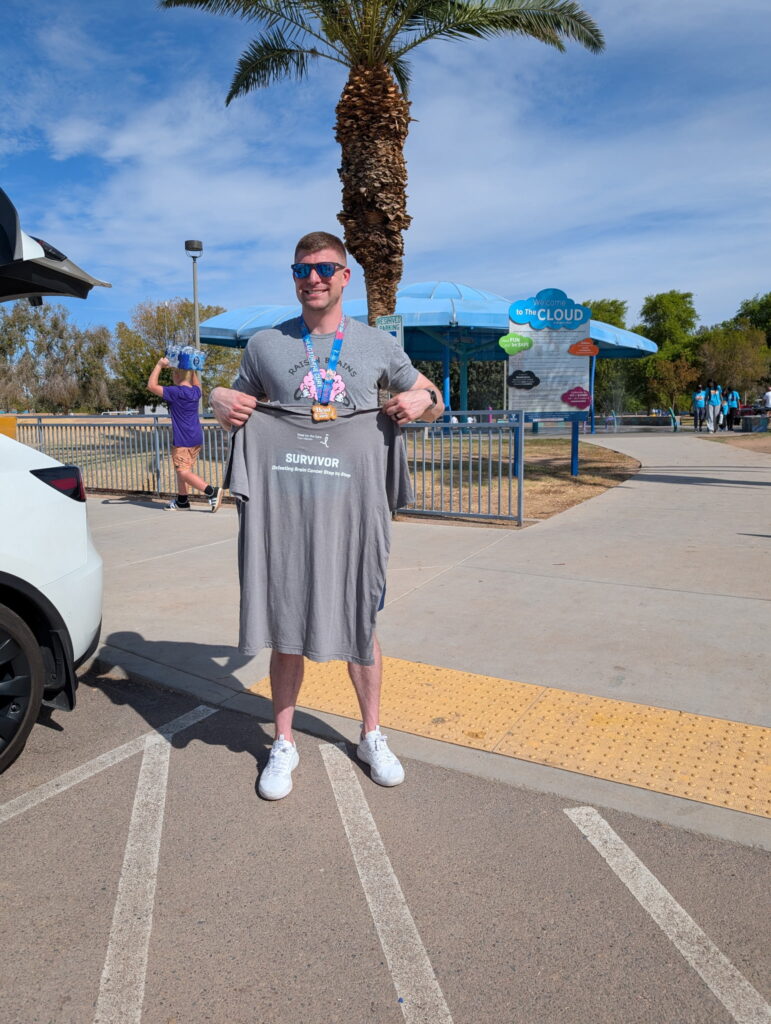
“Josh and Alycia have done an amazing job of creating a community of support,” Jacki said, noting the couple’s involvement in raising brain tumor awareness, including receiving the award for the largest team at the Head for the Cure walk. “They come in droves, and with style. I truly think this community has helped Josh do as well as he has and have supported Alycia in this journey. Josh has come a long way, and it has been a pleasure getting to see the progress he has made and the positive attitude this couple has kept during their journey.”
And it’s not just the brain tumor community that Joshua’s story is impacting; he sees it helping his clients at work, too. He reminds clients that while saving for retirement is important, so is enjoying life now. He encourages them to find balance between planning for the future and living in the present. “It does change your perspective,” Alycia said. “You realize how short life really is.”
Written by Christina O’Haver
